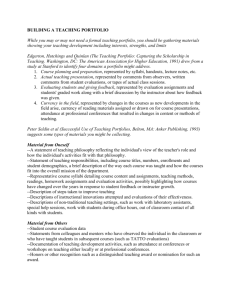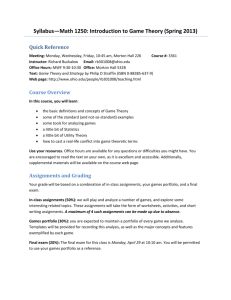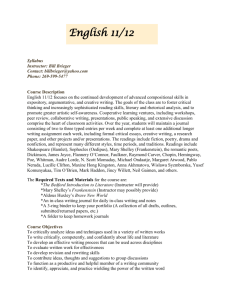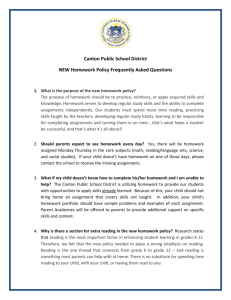1 1 Required Textbook 1: Advanced Project Portfolio Management
advertisement
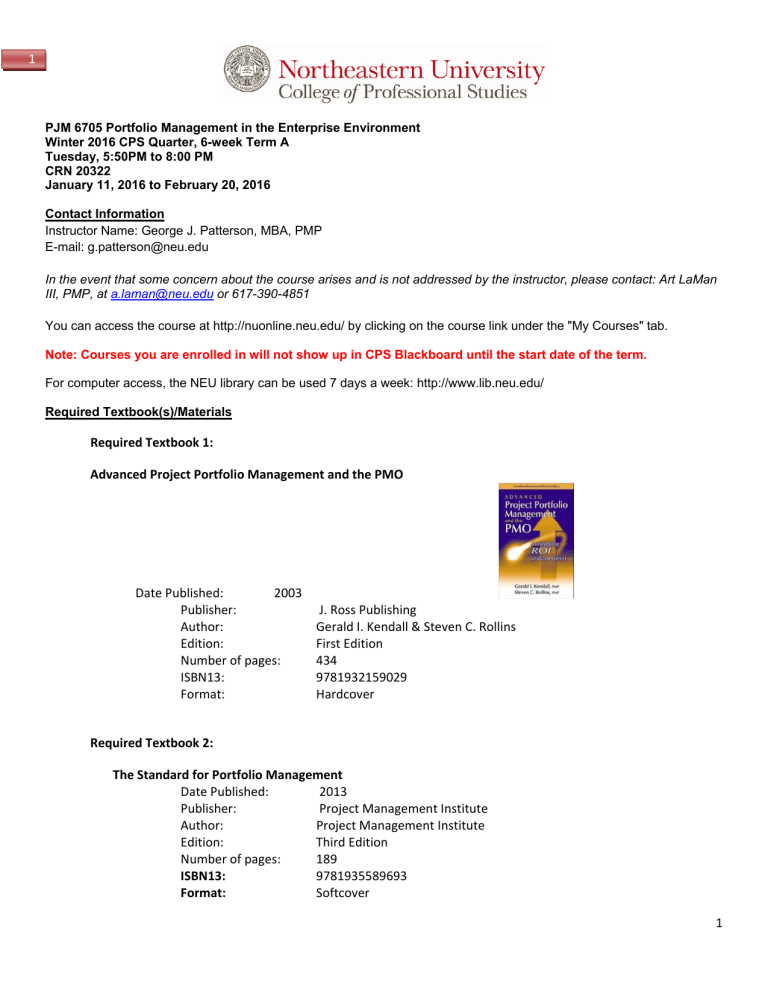
1 PJM 6705 Portfolio Management in the Enterprise Environment Winter 2016 CPS Quarter, 6-week Term A Tuesday, 5:50PM to 8:00 PM CRN 20322 January 11, 2016 to February 20, 2016 Contact Information Instructor Name: George J. Patterson, MBA, PMP E-mail: g.patterson@neu.edu In the event that some concern about the course arises and is not addressed by the instructor, please contact: Art LaMan III, PMP, at a.laman@neu.edu or 617-390-4851 You can access the course at http://nuonline.neu.edu/ by clicking on the course link under the "My Courses" tab. Note: Courses you are enrolled in will not show up in CPS Blackboard until the start date of the term. For computer access, the NEU library can be used 7 days a week: http://www.lib.neu.edu/ Required Textbook(s)/Materials Required Textbook 1: Advanced Project Portfolio Management and the PMO Date Published: 2003 Publisher: Author: Edition: Number of pages: ISBN13: Format: J. Ross Publishing Gerald I. Kendall & Steven C. Rollins First Edition 434 9781932159029 Hardcover Required Textbook 2: The Standard for Portfolio Management Date Published: 2013 Publisher: Project Management Institute Author: Project Management Institute Edition: Third Edition Number of pages: 189 ISBN13: 9781935589693 Format: Softcover 1 2 Required Cases from Harvard Business School Publishing (Available at NU Bookstore) 1) The Atek PC Project Management Office by McFarland, Keil and Huff (9‐308‐049) 2) MDMC, Inc. (B) Strategic IT Portfolio Management by Jeffrey and Norton (KEL172) Software MS Office – This software includes MS Word, MS Excel and MS PowerPoint which will be used throughout this course and assignments should be submitted in the appropriate application. MS Project (if applicable) – There is no recent version available for the Mac, but you may use one of the campus computers or a virtual workstation which provides access to MS Project. Visit myneu.neu.edu and select the MyApps Link. Windows users may also select Services and Links, and then follow the link to Free and Discounted software to purchase it at a deep discount from NEU. This software may also be used in a Windows environment on the Mac. Other Software and Related Equipment - Optional Wimba Pronto – this free software allows us to have text chats, audio chats (if you have a headset), share a whiteboard and most importantly, share our screens so I can offer you help with your assignments. You can download this free from the Course Tools link on the left column at our Blackboard course site. A headset (headphones plus microphone) will allow you to speak with me using Wimba Pronto. I highly recommend getting this hardware to go along with Pronto. The Logitech ClearChat Comfort USB Headset, or the Plantronics Audio 470 or 500, or comparable brands/models, are recommended. Headsets can be purchased from online vendors such as amazon.com, bestbuy.com, or newegg.com for about $30. Adobe Reader 9.3 or higher – this free software is required to listen to the multimedia lectures. You can download it at www.adobe.com. You will also need speakers attached to your computer or headphones to hear the audio portion. Course Prerequisites PJM 6000 PJM 6010 is strongly recommended PJM 6015 is recommended PJM 6020 is recommended (This course should be taken toward the end of the program.) a) Student Competencies: 2 3 o o o Microsoft Word, Microsoft Excel and Microsoft Power Point are used throughout. Students are expected to already be proficient in the use of these programs. MS Project – steps for creating, planning and managing projects are taught in the PJM 5900 course. Demos will be provided to help you use this software but you will be expected to learn this on your own if you are not a competent user. If required, students will be expected to complete a report and present it in APA Paper Format. Documents describing APA format are available in the course. Course Description Defines the strategies, processes, methods of information, analysis, and preferred deliverables of an effective portfolio management approach. An ever‐increasing number of project managers are being asked to manage multiple, sometimes interrelated, complex projects. This is now a cornerstone skill for a senior project manager. Offers students an opportunity to learn how to identify, select, and de‐select in order to develop a balanced and desirable mix of projects to nurture by means of project termination decisions and management, as well as to attain a knowledge of the components, significance, and challenges of implementing enterprise‐level project portfolio management (PPM) based upon the organization’s strategic business goals. Learning Outcomes Based on satisfactory participation in this course, a student should be able to: 1. Utilize best practices for linking the project portfolio to the organization’s strategic objectives 2. Understand and apply best practices in the 11‐step PMI aligning process for portfolio management 3. Understand and apply best practices in the 3‐step PMI Monitoring and controlling process for portfolio management 4. Identify and manage portfolio risks 5. Develop a PMO charter that successfully supports an organization’s strategic goals 6. Implement a PMO that supports the organization and its portfolio management In pursuing these objectives, the course will… Use the text and cases Combine theory and practice Combine the strategic with the tactical Use relevant concepts to analyze and assess cases Course Methodology Each week begins on Monday and ends on Sunday, except for the final week which officially ends on Saturday. Beginning on Monday of each week, you will view lecture materials, read more about the lecture topic in your course text and then you will complete case studies and other assignments where you will have a chance to apply what you’ve learned. Each week, you will be expected to: 1. Review the week's learning objectives. 2. Complete all assigned readings. 3. Complete all lecture materials for the week. 4. Participate in the Discussion Board (see below for more information). 3 4 5. Complete and submit all assignments by the due dates. All written assignments should be clear, comprehensible and competently produced. 6. Complete all tests and exams by their due dates Class Schedule / Topical Outline Week 1 Dates 1/11 - 1/17 Topic Reading Assignments Discussion Topics Introductions Course Introduction Blackboard Overview Syllabus Review Form Class Teams What is a PMO? K&R: Part I STD: Chapter 1 TEAM Case Study – ATEK PC Project Management Office Introduction – Building an Effective PMO What is a PMO and What Should a High Value PMO Do? Moving Project Management from the Cost Model to the Throughput Model 2 1/18 - 1/24 K&R: Part 2 Strategic Planning STD: Chapter 2 TEAM – Continue working on the ATEK PC Case Applying Deming, Goldratt, and Six Sigma to Systems Thinking The Eight Major Subsystems that Strategic Planning and Project Management must Address The 4 × 4 Approach to Strategic Planning 3 1/25 - 1/31 Project Portfolio Management K&R: Part 3 STD: Chapter 3 Mid Term Exam ATEK PC ATEK PC Presentation Presentations Aligning and 4 5 Maintaining the Portfolio Mid Term Exam – covers material from weeks 1 and 2 Linking Project Progress to Strategic Objectives — The Executive Radar Screen Delivery Management and Acceleration Project Portfolio Management Resource Portfolio Management Asset Portfolio Management 4 2/1 - 2/7 Managing the PMO K&R: Part 3 Continued STD: Chapter 4 Tools for PPM TEAM ASSIGNMENT – MDMC Inc., (B) – Strategic IT Portfolio Management Case Study Managing the MultiProject Environment — The Critical Chain Approach Inputs and Outputs to a PMO PMO Measurement System EPM Tools and Their Value on Project Delivery 5 2/8 - 2/14 K&R: Part 4 Implementing a PMO STD: Chapter 5 TEAM continue working on – MDMC Inc., (B) – Strategic IT Portfolio Management Case Study The PMO Value Proposition Maturity Model — Where Is Your PMO? The Road Map to Implementing a PMO Executives Will Embrace Sustaining the PMO Value — Moving From the Supply Side to the Market Side 5 6 6 2/15 - 2/20 MDMC Presentations and Wrap-up Team Presentations MDMC Team Presentations Final Exam Course Evaluation – On Line Team Peer Evaluations (confidential) – On-Line Final Exam Grading/Evaluation Standards Student participation is required in all aspects of the course. Participation in discussions is defined very clearly as contributing throughout the week to all of the discussions in that week. Minimal preparation is reading the material, and being able to summarize what it is about, what the issue is, and what you would recommend. Superior preparation involves being able to (i) summarize the situation/problem presented by the case; (ii) recommend a solution to the discussed problem; (iii) support your recommendation with relevant details and analyses; (iv) back up your sources with correctly formatted references; and (v) discuss innovative solutions, or why obvious solutions might be discounted. Students are expected to critically interpret the text, challenge assumptions, and use data from several sources (beyond the text), and to make their case and support their arguments. The course grade will consist of four elements that will be weighted as follows: Evaluation Measures 30% Assignments ** 20% Discussion Board 25% Mid Term Exam 25% Final Exam 6 7 **IMPORTANT – When teams are assigned, the Team Project grade has two factors. The first factor is determined by the content and quality of the team presentation. The second factor will be used to adjust the individual team members’ final grade based upon the peer reviews submitted by the other team mates. Teams that do not submit a peer review are deemed to be functional with no individual performance issues. For these teams, they will get the total grade assigned to the team presentation. If warranted, reported issues on the team peer review form could result in a reduced grade for the students that underperformed in the team assignments. Discussion Board grading will follow these general rules: Score % Description 100 Full – Met above requirements, on time and high quality commentary as defined in the grading/evaluation standards under superior preparation 75 Moderate – Late initial response or only 1 secondary response or moderate quality response 50 Minimal – Initial response and either I secondary response or low quality response 0 Inadequate – Missing initial response or missing secondary response If warranted, the instructor may either increase or decrease the above discussion board grade. Grading Rubric Conversion of weighted and rounded numerical grades to letter grades will be as follows: Letter Grade Low High A 94 100 A‐ 90 <94 Description An A will only be awarded to students who perform at an exemplary level. Students who go beyond the basic assignment guidelines by evidencing not only a simple understanding of the material, but whose work represents the highest level of excellence and thoughtfulness will have the opportunity to earn an A on their assignments. 7 8 B+ 87 <90 B 84 <87 B‐ 80 <84 C+ 76 <80 C 73 <76 C‐ 70 <73 F 0 <70 A B will be assigned to the assignment submission that meets the guidelines of the assignment and is very good. If you follow the assignment instructions and include all the required information, then you will most likely receive a B for your submission. Earning a B means that you have a solid grasp on the concepts covered in the assignment and have met all the requirements. A C is assigned to work that has most of the required components but does not include all the required information or parts of the assignment. Earning a C means that you have not completed some important parts of the assignment instructions. An F is assigned to work that is missing much or most of the required portions of the assignment or where the submission is very poorly executed. This communicates that you have not grasped a basic understanding of the material or the assignment requirements. The instructor reserves the right to scale grades as needed. Factors that can reduce your grade are: Late Assignments without an excuse Low activity level in Discussion Board Participation Moderate or minimal proficiency in written assignments Failure to complete a required assignment or exam will earn a grade of I (incomplete) for the course. Refer to the CPS Undergraduate and Graduate Student Handbook at: http://www.cps.neu.edu/student‐services/student‐handbook. Assignment Standards It is suggested and encouraged that all students post their content oriented communications to the Discussion Board instead of e-mail so that all students can benefit from each others’ learning Each assignment is due on the date indicated - late assignments will not receive any points. There are no makeup dates or extensions for the assignments except for documented personal emergencies or special permission granted by the instructor in writing. 8 9 Special permission must be requested in writing to the instructor at least two days prior to the due date of the assignment. However, no late submissions or extensions are available for the last week of class. All work must be turned in on time or students will not be given credit for the course. Late discussion board responses will receive no credit Discussion Board Standards Participation/Discussion Board The Discussion Board is an excellent format to use to ask questions, get help and solicit other classmates’ opinions and input. So that we effectively use this tool, here are the class expectations: Each week students must post at least one “primary response” (answering the discussion question) and two secondary responses (responses to other students’ posts). Your participation is worth 20% of the total course grade. How do you get other students to interact with your posts? By posting to theirs! Posting something brilliant on Sunday night is too late to generate a discussion. Please post early, post often. Primary posts are due no later than 8:00 pm three days after the class meets to allow other students time to read and respond to your posts. For online classes, the primary post is due on Wednesday. Secondary responses are due no later than midnight the day before class and on Sunday for online classes. Responses should address the question or issue in a professional manner. Consider that your Manager has posed the question and respond accordingly. The quality of the response is more important than quantity. If there is a question of general interest, please use the Watercooler in the discussion board Avoid the following responses: Simple “I agree” or “Good point” statements alone. Off-topic postings. Use the “Water Cooler” forum for non-course-related discussion postings or additional postings. Late discussion board responses will receive either no or significantly reduced credit Participation/Attendance Standards This section only applies to blended and hybrid classes. As the weekly class session is a vital part of the learning experience, all students are expected to attend every week, be on time for the start of class, and stay until the end of class. However, in the event of extraordinary, legitimate and unavoidable situations, students may be excused for lateness or absence. Extraordinary, legitimate and unavoidable situations include personal illness, urgent family business, work-related issues, transportation-related issues, religious requirements. If at all possible, students should let me know by e-mail about the excused absence or lateness before class. Writing Quality Standards 9 10 Scoring Level High level of Proficiency Grammar, Mechanics, Usage While there may be minor errors, the paper follows normal conventions of spelling and grammar throughout and has been carefully proofread. Appropriate conventions for style and format are used consistently throughout the written assignment. Moderate Proficiency – half grade level reduction (5%) Frequent errors in spelling, grammar (such as subject/verb agreements and tense), sentence structure and/or other writing conventions distract the reader, but the reader is able to completely understand what the writer meant. Writing does not consistently follow appropriate style and/or format. Minimal Proficiency – full grade level reduction (10%) Writing contains numerous errors in spelling, grammar, and/or sentence structure which interfere with comprehension. The reader is unable to understand some of the intended meaning. Clarity and Coherence Sentences are structured and words are chosen to communicate ideas clearly. Sequencing of ideas within paragraphs and transitions between paragraphs make the writer’s points easy to follow. Sentence structure and/or word choice sometimes interfere with clarity. Needs to improve sequencing of ideas within paragraphs and transitions between paragraphs to make the writing easy to follow. Sentence structure, word choice, lack of transitions and/or sequencing of ideas make reading and understanding difficult. Style and/or format are inappropriate for the assignment. If you need help to improve your written communication, the following free resources are available: Smarthinking (available free in Tool section of Blackboard) – this allows students to submit personal written material in any subject and have it reviewed by an e-instructor within a 24-hour window (in most cases). The Purdue Online Writing Lab (http://owl.english.purdue.edu/owl/) provides free writing resources – with help in grammar, sentence structure and general writing skills NEU Writing Center - To learn more about what the Writing Center has to offer, please see the three options below and, for more details, visit: http://www.northeastern.edu/english/writing-center/ 1. In-person Consulting: Work one-on-one with a consultant, or bring a friend and work as a group. We also accept walk-in appointments; they are available on a first-come, first-served basis if a consultant is available. However, we strongly encourage you to make an appointment in advance. 2. Email Submissions: If you are unable to come to the Writing Center for an appointment, you might consider submitting your work online. Our web consultants will comment on content development, structure, and organization; they will not mark up your text for grammar, sentence structure, or spelling. If you would like help with your grammar, an in-person appointment is the best option for you. Our web consultants check for submissions M-F, and will respond to your submission within 48 hours. 10 11 3. Mobile Consulting: If you have a pressing deadline, or live far away from campus, consider signing up for our new mobile consulting option. Like in-person consulting, this is a real-time, 45-minute session with a Writing Consultant. Unlike Email Submissions, which have a 48-hour turn around, you get to speak immediately with a consultant about your work. Simply sign into WCOnline’s new remote consulting schedule to make an appointment with one of our dedicated mobile consultants. Want to know more? Visit http://www.northeastern.edu/english/writing-center/mobile-consulting/. ESL Language Co-op tutoring - is a free service international students (both undergrad and grad) are welcome to use. This service allows students to work 1:1 with ESL trained writing specialists. You can sign up for one-hour sessions by emailing: languagecoop@neu.edu and indicating when you would like to make an appointment. 1. All sessions are held in 88 Snell. Starting on May 7, they’re moving to an online scheduling system, so students won't email to schedule, but they'll just go to this website (http://neu.mywconline.net/) and make an online appointment. Communication/Submission of Work In the Assignments folder, click on the View/Complete Assignment link to view each assignment. Attach your completed assignments here and click Submit. Once your assignment has been graded, you will be able to view the grade and feedback provided by clicking on Tools, View Grades from the Northeastern University Online Campus tab. Each week there are homework assignments. Every student will be expected to conduct research in the completion of these assignments. All written assignments are due when indicated in the assignment description. Late Submission of Work As stated in the Student Handbook at http://www.cps.neu.edu/student-services/student-handbook, you must notify me and obtain my acceptance if you are unable to complete any assignment by the published submission deadline. I will gladly grant extensions for assignments (but not for the Discussion Board) as long as the request is made through e-mail at least 24 hours before the due date. However, no late submissions or extensions are available for the last week of class. HU UH Academic Honesty and Integrity Statement Academic Honesty and Integrity Statement Not only does the University view academic dishonesty as one of the most serious offenses that a student can commit while in college, but, as your instructor, I want you to know that I also take this offense very seriously. In addition to abiding by the laws of the university, as a future project manager, you will also need to abide by PMI’s Code of Ethics & Professional Conduct (http://www.pmi.org/About-Us/Ethics/Code-of-Ethics.aspx), which includes an honesty section very similar to the academic honesty principles outlined by NEU. PMI’s Code states: “As practitioners of project management, we are committed to doing what is right and honorable. We set high standards for ourselves and we aspire to meet these standards in all aspects of our lives.” (PMI Code of Ethics and Professional Conduct, Section 1.1) Regarding honesty, this code reminds us that as project practitioners, we are obligated NOT to “engage in or condone behavior that is designed to deceive others…” but to “make commitments and promises, implied or explicit, in good faith”. (PMI Code of Ethics and Professional Conduct, Section 5.2 & 5.3) 11 12 Please understand that I will not tolerate any instances of academic dishonesty in this course. If I suspect a student of violating our academic policy, I will notify the student and give them a chance to review my concerns. If I am not completely satisfied that there was no violation of the policy, I will refer the student to the Office of Student Conduct & Conflict Resolution (OSCCR) and in most cases, the student will immediately be given a failing grade for the course. Students will not be allowed to repeat an assignment or in any way make up for the violation. There is no excuse for academic dishonesty. Please make sure that you completely understand what is expected of you. Academic honesty means being truthful at all times in your communications and in your conduct. It also means letting your instructor know if you are aware of any instances of academic dishonesty, even if you were not involved in the dishonest actions. This policy applies to ALL assignments – draft, final, extra credit, team, individual, etc. While the following is not an all-inclusive list, I hope this will help you to understand some of the things instructors look for. The following is adapted from the University’s policy on academic honesty and integrity; the complete policy is available at http://www.northeastern.edu/osccr/academicintegrity/index.html Cheating – intentionally using or attempting to use unauthorized materials, information, or study aids in an academic exercise of any type. This may include use of unauthorized aids (notes, texts), or copying from another student’s exam, paper, computer disk, etc. Fabrication – intentional and unauthorized falsification, misrepresentation, or invention of any data, or citation in an academic exercise. Examples include making up data for a research paper, altering the results of a lab experiment or survey, listing a citation for a source not used, or stating an opinion as a scientifically proven fact. Plagiarism – intentionally representing the words or ideas of another as one’s own in any academic exercise without providing proper documentation of the source by way of a footnote, endnote, or inter-textual note. Self-plagiarism (resubmitting materials from another course or course section as new work) is also prohibited. Unauthorized collaboration – Students, each claiming sole authorship, submit separate reports, which are substantially similar to one another. While several students may have the same source material, the analysis, interpretation and reporting of the data must be each individual’s alone. Note that if two students turn in the same paper, both students will be punished, regardless of which student did the work. NOTE: Unauthorized collaboration also includes lending my work to another student. I know that I may help my fellow students by explaining concepts to them or suggesting additional reading, but not by giving them my work, examples of my work, or answers to specific questions or exercises. I won’t, for example, lend my papers, discs, computers, flash drives, or any other version of my work to other students. I know that if they copy my work, even without my permission, I will also be charged with academic dishonesty. I know that I’m expected to safeguard my work. (Also see the section on “participation in academically dishonest activities below”.) Participation in academically dishonest activities – Examples include stealing an exam; using a prewritten paper obtained through mail order or other services; selling, loaning or otherwise distributing materials for the purpose of cheating, plagiarism, or other academically dishonest acts; alternation, theft (including the unlawful use of copyright materials), forgery, or destruction of the academic work of others. Facilitating academic dishonesty – Examples may include inaccurately listing someone as co-author of paper who did not contribute, sharing a take home exam, taking an exam or writing a paper for another student. Withholding information about dishonesty – not notifying your instructor immediately after observing a real or potential act of academic dishonesty. Examples include: (1) seeing other students take an exam together in the library or elsewhere, even if you took the exam by yourself, (2) working with a team member who tells you that the part of the team report they submitted was written by someone not on the team, or (3) hearing a student tell the teacher they couldn’t come to class because they were sick when you know this isn’t true. 24/7 NU Online Technical Support Get immediate 24/7 technical support for NU Online by calling 855-836-3520 or email NUOnline@neu.edu. 12 13 For answers to common questions you may also visit the NU Online support portal at: http://smartipantz.perceptis.com/neu/content/default.aspx MyNEU Technical Support Please contact the University help desk by calling 617-373-HELP (4357) or email help@neu.edu 13
